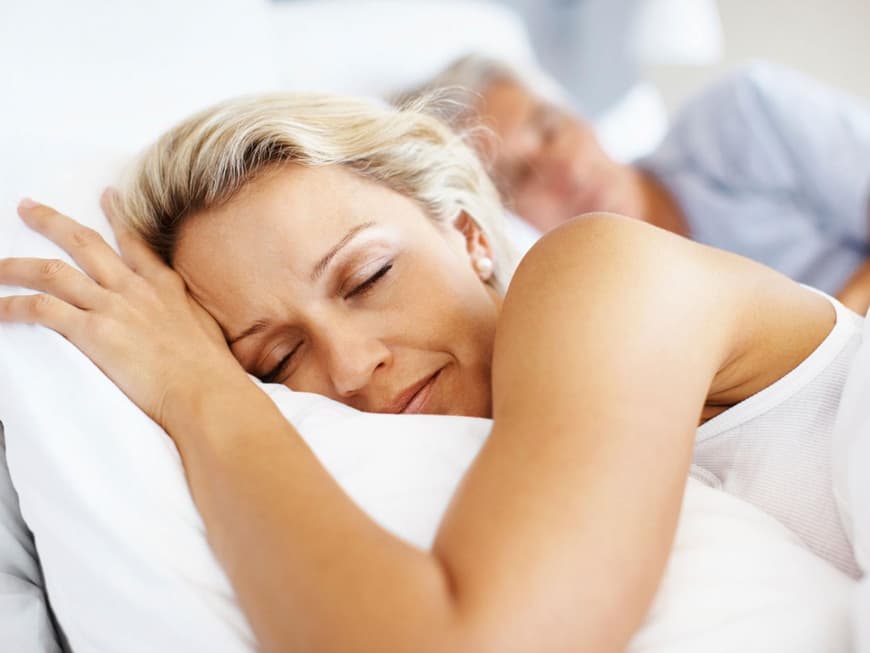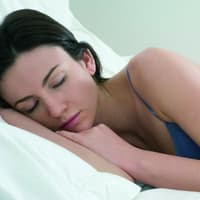
Sufficient sleep is vital
Restful rest at night is important, vital. Only in recent years has science recognized how much we need sleep to stay physically healthy and mentally fit. Gone are the days when only the over-sleeping manager was taken seriously and the late sleeper was branded a lazy bum - fortunately! But although sleep has been made socially acceptable again, Germans still have problems with the night. According to the DAK health report, 80 percent of working people sleep badly, and with unsightly regularity. One in ten employees suffers from insomnia, a particularly serious sleep disorder. The causes of sleep disorders are manifold: stress is one of the main reasons, and a poor lifestyle with little exercise and a poor diet is also often the cause.
In a study on the subject of "How much sleep do you need", test subjects were divided into two groups: 48 volunteers were only allowed to sleep for six hours, while a control group was not allowed to rest at all on two nights. The members of the first group were also tested every two hours for their memory performance and reaction time. After two weeks, the test subjects with the supposedly high amount of sleep were just as tired and stressed as those who had slept through two nights. What's more, they completely misjudged their situation and didn't even realize how unfocused they were! This can be dangerous on the road. So until now, there has obviously been a misconception in science about how much sleep is healthy.
Too little sleep
Too little sleep makes you fat, as well as stupid and ill. A lack of sleep has similar effects on the brain as alcohol. Around eighty percent of Germans sleep less than seven hours, according to a survey by the opinion research institute Emnid. Doctors warn that people who sleep too little have a significantly increased risk of cardiovascular problems, arteriosclerosis, heart attacks, strokes and heart failure. The hunger hormone ghrelin is released more frequently, which is why they often suffer from food cravings. The level of stress hormones is also constantly elevated, which is dangerous for the heart.
Too much sleep
This is just as unhealthy: research has found in many studies that too much is not healthy. Instead of starting the day well-rested and fit, extreme late sleepers (ten hours or even more) are tired and listless in the morning. This increases the likelihood of depression by 49 percent and significantly increases the risk of diabetes, cardiovascular weakness and a heart attack. Too much sleep is also bad for your memory and makes you fat.
Healthy sleep is important for regeneration
The doctors deduce from the study results that our body needs a minimum of seven hours' sleep to carry out vital regeneration processes - including in the brain. Of course, how many hours of sleep you need is completely subjective, but six hours is generally not necessarily enough. And there are numerous causes of poor sleep or even insomnia:
Apnea
Obstructive sleep apnoea syndrome (OSAS) is the technical term for this phenomenon. Sleepers simply stop breathing, sometimes for just a few seconds, sometimes for almost a minute. Breathing then resumes with a cracking snore. The patients don't notice - in the morning they wake up totally shattered. Cause: weak connective tissue. The throat muscles slacken during sleep and block the upper airways. 15 percent of women and 20 percent of men suffer from this. Treatment: A face mask or a dental splint ensures there is enough space in the throat.
Snoring partner
Around 30 million Germans snore like crazy at night- 60 percent of men and 40 percent of women. According to the British Lung Foundation, unnerved sleepers lose an hour and a half due to their partner's snoring. The noise level fluctuates between the soft rustling of leaves and a truck at full speed. The choice of remedies to combat the noise is huge - but the benefits are unfortunately doubtful. But there is help: the mucous membrane of the throat can be tightened with a laser, for example - but that's for the doctor to decide. What is guaranteed to help in the beginning: sleep separately.
Side and stomach
If you sleep on your right side, the stomach presses on the pancreas and hinders its activity. One in eight Germans sleeps on their stomach. Incidentally, this is the most unhealthy position of all: the head is angled to one side, twisting the cervical vertebrae. Headaches are a consequence, as are shoulder and back problems. The internal organs are squeezed, blood circulation is restricted and nerves are pinched. Experts therefore recommend sleeping on the left side. This also supports the lymphatic system.
Poor mattress
A good mattress is at least 16 centimetres thick, not too hard and not too soft. The spine must form a straight line. Try it out in the store! You can find more tips for the right mattress here.
The different sleep phases
The body goes through the different sleep phases four to six times a night - one cycle lasts around 90 minutes. The first stage of sleep is falling asleep. The body relaxes within a few minutes and the brain also slowly comes to rest. This is followed by light sleep. The body relaxes even further, breathing and heartbeat slow down. This phase lasts 30 to 60 minutes. This is followed by the deep sleep phase of up to one hour, the other deep sleep phases are shorter. This is where the body regenerates. In the REM phase that follows, the sleeper dreams and the eyes move quickly. Then the cycle starts all over again.
The fairy tale of the "early bird"
Research has established that there are two types of sleeper: Owls (night owls) and larks (early risers). This is genetically determined and cannot be influenced. However, the larks are clearly outnumbered: Only one sixth of our society arrives at work at seven in the morning well-rested and in good spirits.
Social jet lag
These few larks impose a sleep rhythm on the owls that drives them into collective sleep deprivation. This is because owls are only at their best in the evening and at night and therefore sleep longer. The Munich chronobiologist Till Roenneberg calls this discrepancy between the internal clock and external pressure from society social jet lag. Studies show that this increases the risk of cardiovascular disease, diabetes and dementia.
A good sleep drink
What you need: 1 glass of milk, 1 egg yolk, 1 teaspoon of honey. Here's how it works: Heat the milk, then leave to cool slightly. Add the honey. Beat the egg yolk until frothy and fold in. Pour into a glass and sprinkle with nutmeg. These ingredients help: The calcium in the milk allows the muscles to relax more quickly. And the amino acid tryptophan ensures the release of the sleep hormone melatonin.
3 questions for the expert
Dr. Hans-Günter Weeß is a member of the board of the German Society for Sleep Research and Sleep Medicine. He heads the Sleep Medicine Department at the Pfalzklinikum Klingenmünster.
What actually constitutes good sleep?
We recognize healthy sleep by the fact that we are efficient, alert and receptive during the day. If we feel like this in the morning, we have slept well.
How do you get it?
Unfortunately, there is no single tip for everyone, because everyone is different. The most important thing: don't tense up! Before you go to bed, you should be relaxed and clear-headed and not take any problems from the day into the night. I know it's not that easy. Writing in a diary in the evening can help to get rid of nagging thoughts before going to bed.
How much sleep per night is best?
Again, people are different. But 80 percent get by just fine with six to eight hours a night. By the way: Waking up a few times a night is completely normal, don't worry!





